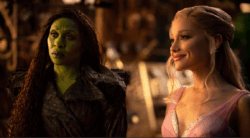The world is chock-full of competing theories. Is evolution or intelligent design behind the origin of mankind? Was ‘N Sync or the Backstreet Boys the superior boy band of the ‘90s? Does the Leo’s smell come from cleaning detergent or divine intervention? But no theories are more hotly debated than the meaning behind hit dramas—Lost, anyone?—and AMC’s comic book adaptation The Walking Dead is no exception.
A tale of a group of survivors living through a zombie apocalypse in the backcountry of Georgia, The Walking Dead is at first glance a gory, violent thriller—and undoubtedly an entertaining one. But behind the bludgeoning of the reanimated dead and human faces being eaten off, The Walking Dead has a deep thematic message; the critics just aren’t sure what that message is.
Some, most notably The Atlantic contributor Jeffrey Goldberg, have described The Walking Dead as an allegory for the Holocaust, with the survivors symbolizing the plight of the Jews fleeing from safe house to safe house to avoid a brutal end. Others, such as Daniel Drezner, preeminent zombie-policy theorist and author of Theories of International Politics and Zombies, see The Walking Dead as a portrayal of the fight against terrorism and part of a larger conservative narrative about security, guns, and the role (or lack thereof) of the state. More generally, as with all apocalyptic fiction, The Walking Dead could very well just be an exploration of the strength of the human will to survive.
While all of these theories are certainly plausible, I think none better describes the root of The Walking Dead’s message than the potential for rebuilding society’s primary institutions.
The zombie apocalypse destroys the basic tenets and biases of our society. Government collapses. Public services cease to exist. Class distinctions vanish. Cultural differences lose relevance. Our traditional gender roles matter less than ever before.
And so, despite the hardship of the fight to survive, the zombies also give the characters a chance to rebuild their world: a world that for many of the characters wasn’t working out all that well.
Carol escapes an abusive marriage and discovers true love in her relationship with Daryl. Glenn escapes a dead-end job as a pizza delivery guy to become the unlikely hero and get the girl. More dramatically, Axel escapes from prison and gets a chance to redeem himself and join the gang of survivors.
But the opportunity of the zombie apocalypse has its limits, both emotionally and physically. Lori’s infidelity continues to poison relations within the group even after Rick’s murder of Shane. Hershel loses his leg from a zombie bite and must now hobble around on one leg. Lori dies in childbirth, and T-Dog just dies. (ativan) No amount of dismembered institutions can circumvent physical realities.
Perhaps no institution has suffered from such limitations as the characters’ ability to create new families. As characters have died off, the gang of survivors has had to increasingly rely on each other as family while lacking the physical bonds of sex or blood. Daryl assumes the role of a mother in naming Lori’s baby Lil’ Asskicker. Carol and Hershel help parent Carl, even though they’re not related.
Yet, if this Sunday’s season three midseason premiere taught us anything, it’s that such bonds have their limits. When Daryl reconnects with his unpredictable brother Merle, blood triumphs over the new family bonds Daryl built with the camp and he decides to leave. Conversely, Maggie is unwilling to accept Merle into the camp, fearing for the safety of her blood father and sister back at the prison.
And then comes Rick, The Walking Dead’s unlikable protagonist. Rick’s always been plagued by an unwavering loyalty to his blood-related kin over his newly formed “family.” Whether in his dip into insanity after Lori’s death and subsequent apparition that put the entire camp at risk or his protracted reluctance to arm Carl, Rick, despite honorably claiming to put the interests of the group first, has always prioritized the interests of his own.
The Walking Dead’s final verdict on the potential to create families inorganically hasn’t yet been settled, an incertitude mirrored in the current cultural and political milieu. On the comedy side, New Girl and The New Normal have built families across racial, generational, and sexual lines, but such bonds can never be pushed to their limits in comedy as they have been on The Walking Dead. When every day is a struggle for life and death, the question of who lies in your inner circle, in your family, rears its head in ugly and uncomfortable ways.
Therein lies The Walking Dead’s most chilling challenge to its viewers: Who would you give up your life for, family or “family?” Guess we’ll just have to wait for a zombie apocalypse to find out.




